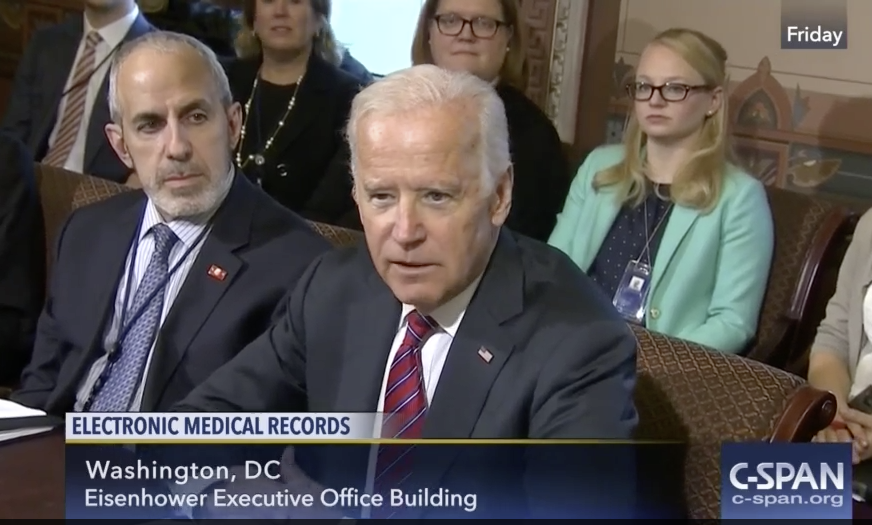medical infrastructure
See the following -
Is The 1.5+ Trillion Dollar HITECH Act a Failure?
 Hopefully, the public statements made by President Obama and Vice President Biden will lead to a public debate over the monumental problems that the HITECH Act and proprietary EHR vendors have caused the American people. While the press continues to report the figure of $35 billion as the cost of implementing EHRs, that figure does not tell the entire story. Perhaps the next step is to provide accountability and transparency. That would start with firm numbers regarding the real costs of EHR implementations forced on an unprepared healthcare system by the HITECH Act.
Hopefully, the public statements made by President Obama and Vice President Biden will lead to a public debate over the monumental problems that the HITECH Act and proprietary EHR vendors have caused the American people. While the press continues to report the figure of $35 billion as the cost of implementing EHRs, that figure does not tell the entire story. Perhaps the next step is to provide accountability and transparency. That would start with firm numbers regarding the real costs of EHR implementations forced on an unprepared healthcare system by the HITECH Act.
- The Future Is Open
- Login to post comments
Moving Counter-Clockwise: Lessons from Hurricanes, Floods and Earthquakes
 The plethora of natural disasters raises all sorts of complicated but expected issues – from discussions of the legitimacy of global warming to the adequacy (or lack thereof) of on the ground relief efforts. One would have thought that post-Katrina, we would be ready, willing and able to provide immediate relief to those in need of disaster relief...despite capacities, we have been stunningly slow in moving these new services into disaster areas. Instead of technology advancing the ball, it is as if we are moving our clocks backwards. Sure, in the absence of cell towers, creative workarounds have been enabled like ATT&T facilitating communications to/from the mainland for its customers.
The plethora of natural disasters raises all sorts of complicated but expected issues – from discussions of the legitimacy of global warming to the adequacy (or lack thereof) of on the ground relief efforts. One would have thought that post-Katrina, we would be ready, willing and able to provide immediate relief to those in need of disaster relief...despite capacities, we have been stunningly slow in moving these new services into disaster areas. Instead of technology advancing the ball, it is as if we are moving our clocks backwards. Sure, in the absence of cell towers, creative workarounds have been enabled like ATT&T facilitating communications to/from the mainland for its customers.
- Login to post comments
Obama and Biden Blast EHR Vendors for Data Blocking
 As they are winding their terms in office, President Barack Obama and Vice President Joe Biden dropped a stink bomb on the health IT industry. Speaking at different events on Friday, January 9th, the President and Vice President both criticized proprietary electronic health record (EHR) vendors as the primary obstacle to the success of their administration’s health care strategy. This is the highest level acknowledgment so far of the serious impact that “lock-in” EHR software vendors are having on America’s medical infrastructure and the ability of physicians to provide medical care.
As they are winding their terms in office, President Barack Obama and Vice President Joe Biden dropped a stink bomb on the health IT industry. Speaking at different events on Friday, January 9th, the President and Vice President both criticized proprietary electronic health record (EHR) vendors as the primary obstacle to the success of their administration’s health care strategy. This is the highest level acknowledgment so far of the serious impact that “lock-in” EHR software vendors are having on America’s medical infrastructure and the ability of physicians to provide medical care.
ThoughtWorks' Bahmni Helps Small, Low-Cost Hospitals Improve Patient Care
Hundreds of patients at the Jan Swasthya Sahyog (JSS) hospital in Chhattisgarh’s Bilaspur used to spend hours carrying documents to different windows. ThoughtWorks’ Bahmni, an open source medical record system, has attempted to put an end to that. The open source software platform was developed by engineers of software firm ThoughtWorks in Bengaluru and Hyderabad to help doctors keep medical records, lab reports and other related information and treat their patients better...
- Login to post comments